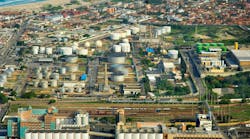With Japanese financial backing, Saudi Arabia and other Persian Gulf oil-exporting states have confirmed they will provide Jordan with crude and fuel oil, replacing supplies from Iraq that stopped on Mar. 20, the first day of the US-led war against Baghdad.
"The kingdom will be among Arab countries that will compensate Jordan with its oil needs," Saudi Arabia's Prince Saud Al Faisal told a press conference Mar. 26. But he added: "It will not be at preferential prices."
That was a dig at the fact that Iraq has covered all of Jordan's requirements for crude and fuel oil for the past 13 years under a special arrangement: one half at preferential prices and the other half an outright gift from Iraqi leader Saddam Hussein.
A Saudi official, speaking in Riyadh on condition of anonymity, said Saudi Arabia and UAE together would provide the 120,000 b/d of oil that the Jordanians normally received from Iraq this time of year.
Jordan's Japanese support
To help pay for the oil, Japan said it would provide Jordan with $100 million in emergency aid. "We realize that Jordan's economy would be severely affected by the war on neighboring Iraq, especially after the disruption of the flow of oil," said a spokesman for the Japanese embassy in Amman.
The Japanese offer created a breakthrough for Jordan, which earlier had negotiated to get 60% of its oil from Saudi Arabia and the remaining 40% from the UAE and Kuwait.
But the deal was dropped, apparently after Jordan decided it would cost too much.
Absent that plan, government authorities commissioned the private Jordanian firm, Millennium for the Trade of Raw Materials & Mineral Oils, to purchase and stock additional emergency supplies of oil from Iraq.
Millennium bought oil from Iraq and transported it aboard tankers from the Iraqi port of Khor al-Amaya to an unspecified location in the gulf, where it was being kept on standby for onward transmission to Aqaba.
"The crude oil is stocked in these tankers, which are deployed in the gulf and will only be dispatched to Aqaba port if Jordan faces shortages," one official told the Jordan Times on condition of anonymity.
The deployment of tankers in the gulf for Jordan was confirmed on Mar. 21 by Lloyd's List shipping newspaper, which said that shipbrokers had reported a "continued surge of activity in fixing tankers for Jordanian account, mainly through Millennium Ministry of Amman, a chartering name that is said to have popped up only in the past 2 months or so."
Lloyd's List explained: "At least five (Suezmax-class tankers) and two (very large crude carriers), mostly aging tankers, are reported to have been fixed on storage time charters for the account recently at sky-high rates."
Lloyd's List said that one of them, the 405,000 dwt Marine Pacific, had been "transshipping Iraqi oil off Fujairah (last week) in what may be part of an urgent operation to boost Jordan's energy stocks launched ahead of the attack against Iraq.
"The 1979-built Marine Pacific was reported by brokers earlier this week to be engaged on a 45-day storage charter at $95,000 daily, but its operator, Scope Management of Geneva, declined to comment on the ship's activities," the industry paper said.
The paper said: "The Marine Pacific, managed by ScopeU, was believed to be accepting the crude from Greek-owned Suezmaxes that loaded the cargoes from Iraq in February."
By then, though, Jordan's plan was coming undone after public disclosures that the oil loaded at Iraq's port of Khor al-Amaya was illegal under provisions of the United Nation's oil-for-aid program (OGJ Online, Feb. 24, 2003).
Under those provisions, exports of Iraqi oil are allowed only from Mina al-Bakr on Iraq's gulf coast and the Turkish port of Ceyhan.
Absent their Iraqi oil, the Jordanians hurried back into talks with Saudi Arabia and the UAE to clinch that deal for their needed supplies of crude—with financial help from Japan. Jordanian officials said the oil was expected last week, aboard a vessel bound for the Gulf of Aqaba.
Oil trucking halt
Meanwhile, on Mar. 22, to make way for the new supplies of Saudi oil, the Iraqi-Jordanian Land Transport Company (IJLTC), under an agreement reached with Jordan's Ministry of Energy and Mineral Resources, started transporting crude oil from the storage facilities in Aqaba to the Jordanian Petroleum Refinery Co. (JPRC) refinery at Zarqa.
The agreement was necessary to compensate for the almost complete halt in oil trucking between Jordan and Iraq on Mar. 21, shortly after the onset of hostilities.
"The deal ensures that the company, using 350-400 oil tanker trucks, will transport an average of 10,000 tonnes/day of oil from the JPRC reserve facilities in Aqaba to JPRC's refinery in Zarqa," said IJLTC Dir. Gen. Hisham Asfour.
The volume is nearly the same amount of oil the tanker trucks brought from Iraq to Jordan prior to hostilities in Iraq, he added.



